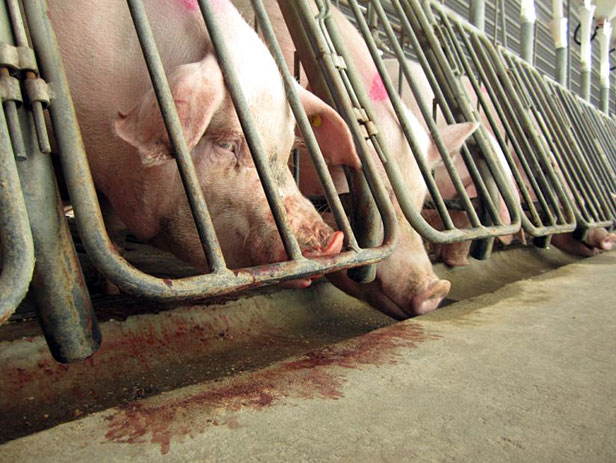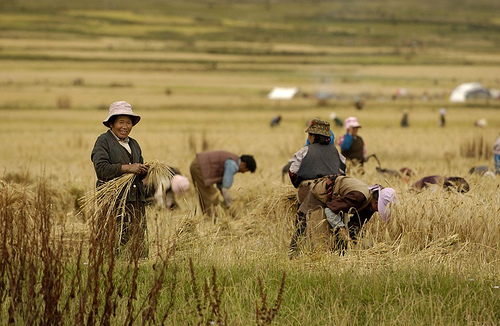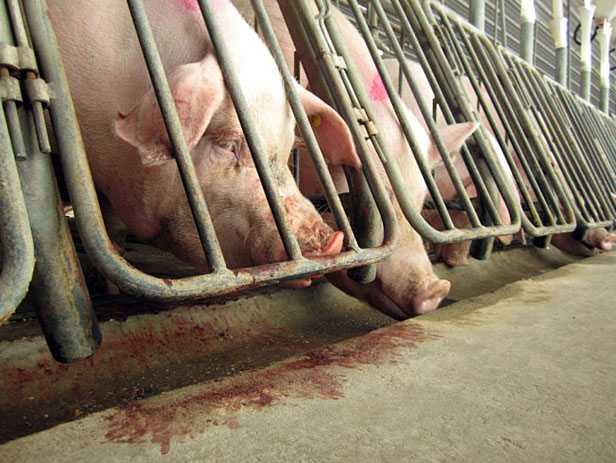
Dear vegans and omnivores: If a) this represents 99 percent of U.S. animal farming; b) and we all oppose it; then c) let's forget about the other 1 percent (for now) and join forces. (Photo by the Humane Society of the United States.)
Every day, Americans eat more than a half pound of meat per capita — one of the highest rates on the planet. The vast majority of it is produced with methods that abuse the environment, animals, workers, and public health as a matter of course. The handful of companies that dominate U.S. meat production suck in more than 40 percent of the corn grown by our farmers — that’s more than 15 percent of the corn grown worldwide. Industrial corn, of course, is our most ecologically destructive crop.
In our society, I can think of two broadly defined groups that abhor our animal-agriculture regime: 1) conscientious omnivores, inspired by the work of figures like Wendell Berry, Vandana Shiva, Michael Pollan, and Eric Schlosser, who think that animals have a place in our farming and our diets, but in a much different way than the prevailing manner; and 2) vegans, who wish to remove animals from our farms and tables altogether.
The two groups present radically different visions, but share an enemy: industrial animal agriculture. Yet rather than collaborate, too often they squabble. Meanwhile, industrial meat lurches on, consolidating its grip on our food system and spreading globally. Enough! The lion must stand in solidarity with the lamb, in opposition to, uh, … the dragon. Thus my new idea: the launching of the Vegan/Omnivore Alliance against Animal Factory Farming (twitter hashtag: #VOAAF).
I see the omnivore/vegan rift in my own work. I spend a lot of time and effort teasing out the meat industry’s depredations and documenting the abject failure of government regulators to reckon honestly with the powerful meat industry (see, for example, this old chestnut on how USDA meat inspectors knowingly allow meat tainted with heavy metals into the food supply; or this one on agribusiness giant Cargill’s little problem with antibiotic-resistant salmonella and school lunches).
When I write these pieces, I hope to be making common cause with vegans and vegetarians. Yet over the years, I have been stunned again and again to find myself in contentious exchanges with them. Sometimes, it’s my own fault: every once in a while, the devil gets into me and I take a capricious poke at the vegans for no good reason. Mea culpa. Never again! Other times, the friction arises seemingly out of thin air. My favorite example is the reaction to a post I wrote a year ago: what I thought was a rather devastating critique of the egregious practice of feeding industrial ethanol waste and “poultry litter” to cows.
“Ho hum,” sniffed one commenter. “Another anti-meat rant from Tom Philpott.” Okay, fair enough. But just two comments later, another reader declared, in response to a brief aside about the nutritional quality of grass-fed beef and milk, “I can only hope that you stop promoting the consumption of meat, for all our sakes.” This, after I had just made clear that industrial meat is really gross stuff. Sigh.
Just last week on Twitter, I found myself in a tense back-and-forth with vegans lamenting my posting of a video showing dairy cows delighting in the first grass of spring. The exchange depressed me. I thought, the type of dairy farming portrayed in the video — corn-free, ecologically robust, cow-friendly — represents a tiny fraction of milk production in industrialized countries. Why go after pasture-based dairy farming when gigantic industrial milk processors rule the market?
Tensions between vegans and industrial-meat-critical omnivores are hardly confined to my work. Michael Pollan, I know, has taken plenty of flack from vegans over the years, even though he’s the author of that classic indictment of the beef industry, the 2002 New York Times Magazine article “Power Steer” (later incorporated into his blockbuster book The Omnivore’s Dilemma).
Then there’s the prominent food commentator James McWilliams, a vegan who specializes in criticizing grass-based livestock raising. He recently argued that “free-range meat isn’t much better than factory-farmed.” But that very same article contains this line: “factory farming … produces 99 percent of the meat we eat.”
If McWilliams is correct, then vegans and omnivores agree on 99 percent of the meat issue. So let’s put aside the other 1 percent — for now — roll our sleeves up, and clasp hands. There’s no fee to join the Vegan/Omnivore Alliance against Animal Factories, no number to call, no petition to sign, no special handshake. Declare you’re a member, and you are one. (I am a writer, not an organizer; the VOAAF will never formally incorporate — under my watch anyway).
So, no more potshots between camps, no lashing out about pastured poultry or dancing dairy cows; and no more mocking the culinary virtues of tofurky and the like. To the ramparts … together! You in?



